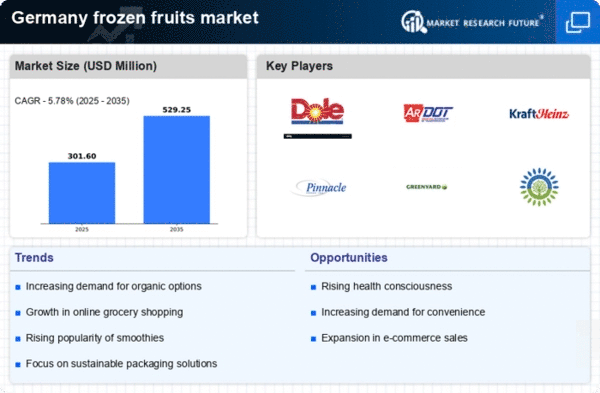Innovative Packaging Solutions
The frozen fruits market in Germany is benefiting from advancements in packaging technology. Innovative packaging solutions enhance product shelf life and maintain quality, which is crucial for frozen fruits. Consumers are increasingly drawn to products that offer convenience and sustainability in packaging. Recent data indicates that the market for sustainable packaging has grown by approximately 18% in the last year, influencing purchasing decisions. The frozen fruits market is adapting to these trends by adopting eco-friendly packaging materials and designs that appeal to environmentally conscious consumers. This focus on innovation in packaging is likely to enhance the market's competitiveness and attract a broader customer base.
Expansion of E-commerce Platforms
The frozen fruits market in Germany is witnessing a significant transformation due to the expansion of e-commerce platforms. Online grocery shopping has gained traction, particularly among younger consumers who prefer the convenience of home delivery. This shift has led to an increase in the availability of frozen fruits through various online channels. Data shows that e-commerce sales in the grocery sector have surged by approximately 20% in the past year, with frozen fruits being a popular category. The frozen fruits market is likely to benefit from this trend, as more consumers turn to online shopping for their grocery needs. Retailers are investing in their online presence, ensuring that frozen fruits are easily accessible, thus enhancing market growth and consumer reach.
Rising Demand for Convenience Foods
The frozen fruits market in Germany experiences a notable increase in demand for convenience foods. As lifestyles become busier, consumers seek quick and easy meal solutions. Frozen fruits offer a practical option for smoothies, desserts, and snacks, appealing to time-strapped individuals. According to recent data, the convenience food sector has grown by approximately 15% in the last year, with frozen fruits playing a significant role in this trend. This shift towards convenience is likely to continue, as more consumers prioritize ease of preparation without compromising on nutrition. The frozen fruits market is thus positioned to benefit from this evolving consumer behavior, as it aligns with the growing preference for ready-to-eat and easy-to-prepare food options.
Increased Focus on Nutritional Value
In Germany, there is a growing emphasis on the nutritional value of food products, which significantly impacts the frozen fruits market. Consumers are increasingly aware of the health benefits associated with fruits, such as vitamins, minerals, and antioxidants. This awareness has led to a surge in demand for frozen fruits, which retain their nutritional content during the freezing process. Recent studies indicate that the frozen fruits market has seen a growth rate of around 10% annually, driven by health-conscious consumers seeking nutritious options. Retailers are responding by expanding their frozen fruit offerings, highlighting the health benefits and convenience of these products. This trend suggests that the frozen fruits market will continue to thrive as consumers prioritize health and wellness in their dietary choices.
Growing Popularity of Plant-Based Diets
The rising popularity of plant-based diets in Germany is significantly influencing the frozen fruits market. As more individuals adopt vegetarian and vegan lifestyles, the demand for plant-based ingredients, including frozen fruits, is on the rise. These fruits serve as versatile components in various plant-based recipes, from smoothies to desserts. Recent market analysis indicates that the frozen fruits market has experienced a growth rate of around 12% in response to this dietary shift. This trend suggests that the market will continue to expand as consumers seek healthy, plant-based alternatives. Retailers are increasingly promoting frozen fruits as essential ingredients for those embracing plant-based diets, further driving market growth.




















Leave a Comment